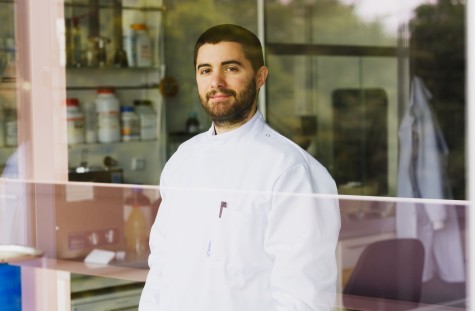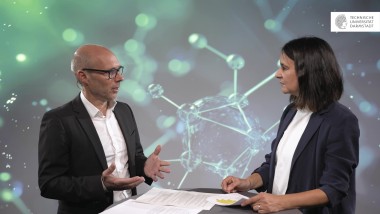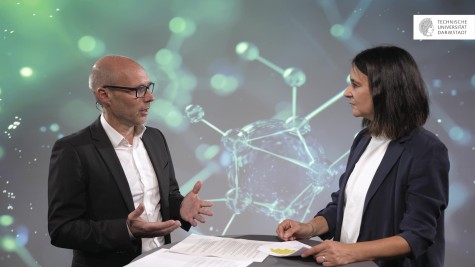Archive: News of Technische Universität Darmstadt
We apologize for not being able to present all of our news in English. Please find a selection of the most important news below. To see all news, please visit our German website.
-
![]() Picture: RMU
Picture: RMU![]() Picture: RMU
Picture: RMU“Let's shape the future together”
2024/10/18
6th RMU Day on 27 November 2024 at the Gutenberg Campus Mainz
The Presidents of the Rhine-Main Universities (RMU) cordially invite you to the 6th RMU Day. This year, the Rhine-Main Universities Day will focus on the RMU’s joint proposal as a consortium in the Excellence Strategy of the German federal and state governments.
-
![Dr. Andrea Belluati]() Picture: Katrin Binner
Picture: Katrin Binner![Dr. Andrea Belluati]() Picture: Katrin Binner
Picture: Katrin BinnerHarnessing the strengths of two worlds
2024/10/15
Biotechnologist Andrea Belluati to lead new Emmy Noether group
A fascinating fusion of two worlds: A new Emmy Noether research group at TU Darmstadt focuses on hybrid systems that combine artificial and living cells to achieve functions that neither can perform alone. Biotechnologist Andrea Belluati is funded by the German Research Foundation (DFG) with 1.8 million euros for his project “Polymer Incorporation for the Engineering of Symbiosis” over the next six years. The newly designed hybrid systems might come to task in more effective drug delivery or sustainable biofuel production.
-
![]() Picture: Tessa Scheufler
Picture: Tessa Scheufler![]() Picture: Tessa Scheufler
Picture: Tessa ScheuflerAnd the Award goes to…
2024/10/11
Unite!’s first Awards
The X. Unite! Dialogue and the II Unite Branding Event brought together around 500 people from Europe to work together on the vision of a European Campus. This requires a great deal of commitment and dedication, and the Unite! community shows a great deal of this, said TU and Unite! president Tanja Brühl at the presentation of the first Unite! Awards and the Unite! Start-up Award during the closing session of the Dialogue.
-
![]()
![]()
How humans react to change
2024/10/07
Professor Constantin Rothkopf, Darmstadt spokesman for the TAM cluster project, in a video interview
Researchers working on ‘The Adaptive Mind’ (TAM) project can hope for the approval of a prestigious Cluster of Excellence. Professor Rothkopf explains what’s behind the project on the adaptability of the human mind. Third and final part of a video series on TU Darmstadt's three Cluster of Excellence applications.
-
![]()
![]()
Unite! Seed Fund for Student Activities 2024
2024/10/01
Find partners at the Unite! Seed Fund Ideathon
The call for applications opens on 15 October until 15 December 2024. This time those interested can also apply to participate in the Unite! Seed Fund Ideathon happening at TU Graz in November to connect with potential partners, so that more Unite! projects can become a reality.
-
![]()
![]()
Research for a more sensible AI
2024/10/01
An interview with Professor Kristian Kersting and Professor Markus Rohrbach, co-speakers of the RAI cluster project
The research initiative „Reasonable Artificial Intelligence’ (RAI) is one of three projects involving TU Darmstadt that are in the running for a Cluster of Excellence. Professor Kersting and Professor Rohrbach give an insight into their research – and explain who could benefit from it in the future. Part two of a three-part video series on TU Darmstadt's Cluster of Excellence applications.
-
![]()
![]()
Communicating biomaterials
2024/09/25
Professor Heinz Koeppl, Darmstadt spokesman of the project ‘CoM2Life’, in a video interview
The cluster initiative ‘COM2Life’ is a project within the framework of the Rhine-Main Universities (RMU), with TU Darmstadt and Johannes Gutenberg University Mainz as partners. Professor Koeppl introduces the research project, which aims to develop a new generation of soft biomaterials. Part one of a three-part video series on TU Darmstadt's Cluster of Excellence applications.
-
![]() Picture: TU Darmstadt
Picture: TU Darmstadt![]() Picture: TU Darmstadt
Picture: TU DarmstadtUnite! as a guest at the TU
2024/09/17
European University Alliance comes to Darmstadt
Since its foundation in 2019, TU Darmstadt has been the coordinator of the European University Alliance Unite! The alliance now consists of nine partner universities from Finland to Portugal and meets every six months for internal working meetings to work on the shared vision of a European campus. The next meeting will take place from 24 to 26 September in Darmstadt, the II Unite! Branding Event on 25 September will bring Unite! to life for all TU members and external partners.
-
![]() Picture: SPZ TU Darmstadt
Picture: SPZ TU Darmstadt![]() Picture: SPZ TU Darmstadt
Picture: SPZ TU DarmstadtEuropean Day of Languages
2024/09/12
TU Darmstadt and Unite! celebrate together
For the first time, the Language Resource Centre of TU Darmstadt is organising the European Day of Languages on 26 September – to coincide with the third day of the Unite! Dialogue, which is also taking place in Darmstadt. Together with the European University Alliance, which consists of nine European partner universities, TU Darmstadt is celebrating Europe's linguistic and cultural diversity and invites its university members and their families to join in.
-
![]() Picture: Igor - adobe.stock.com/Patrick Bal/Katrin Binner
Picture: Igor - adobe.stock.com/Patrick Bal/Katrin Binner![]() Picture: Igor - adobe.stock.com/Patrick Bal/Katrin Binner
Picture: Igor - adobe.stock.com/Patrick Bal/Katrin BinnerERC Starting Grant for two “RAI” researchers
2024/09/11
Projects on learning robotic systems and digital 3D doppelgangers selected
In the current funding round of the European Research Council (ERC), four projects at TU Darmstadt have been awarded a Starting Grant. Two of these went to researchers from the “Reasonable Artificial Intelligence” (RAI) project. “RAI” is in the running for a Cluster of Excellence in the prestigious Excellence Strategy of the German federal and state governments.
-
![]() Picture: ImageFlow – stock.adobe.com/Katrin Binner/Klaus Mai/Patrick Bal
Picture: ImageFlow – stock.adobe.com/Katrin Binner/Klaus Mai/Patrick Bal![]() Picture: ImageFlow – stock.adobe.com/Katrin Binner/Klaus Mai/Patrick Bal
Picture: ImageFlow – stock.adobe.com/Katrin Binner/Klaus Mai/Patrick BalYoung, research-focused, award-winning
2024/09/05
European Research Council supports four projects at TU Darmstadt with ERC Starting Grants
This success is impressive: four young researchers at TU Darmstadt have been awarded a Starting Grant by the European Research Council (ERC) for excellent and innovative fundamental and frontier research. The selected early career researchers will be receiving a total of around 1.5 million euros each for their projects on learning robot systems, digital 3D doppelgangers, permanent magnets and deformed atomic nuclei over a period of five years. This excellent achievement once again shows TU Darmstadt’s research prowess – including by international standards.
-
![]() Picture: Katrin Binner
Picture: Katrin Binner![]() Picture: Katrin Binner
Picture: Katrin BinnerSustainable, safe, affordable: researching innovative magnets
2024/09/05
Dr. Pelin Tozman receives ERC Starting Grant totalling 1.5 million euros
Permanent magnets are crucially important for green technologies. However, their production requires expensive and environmentally harmful raw materials. That is why material scientist Dr. Pelin Tozman from TU Darmstadt is researching resource-friendly alternatives. Her project, MAG-TOOL, is now receiving a Starting Grant totalling 1.5 million euros from the European Research Council (ERC) for five years.
-
![Porträtbild Professor Dr. Justus Thies, Fachbereich Informatik]() Picture: Patrick Bal
Picture: Patrick Bal![Porträtbild Professor Dr. Justus Thies, Fachbereich Informatik]() Picture: Patrick Bal
Picture: Patrick BalThe convincing digital doppelganger
2024/09/05
ERC supports TU professor Justus Thies with Starting Grant
TU professor Justus Thies is receiving a Starting Grant totalling 1.5 million euros from the European Research Council (ERC) for his project ‘Learning Digital Humans in Motion’. The exciting research goal: to develop AI-based image processing and graphic tools to create lifelike digital representations of people for the immersive digital world.
-
![]() Picture: Klaus Mai
Picture: Klaus Mai![]() Picture: Klaus Mai
Picture: Klaus MaiBreaking new ground in nuclear physics
2024/09/05
ERC Starting Grant for physicist Alexander Tichai
Alexander Tichai is receiving a Starting Grant from the European Research Council (ERC) for his project “DeformedNuclei – Ab initio pathway to deformed nuclei”. In the project the theoretical physicist is developing new methods for investigating deformed atomic nuclei and analysing the effects of interaction models on the predicted nuclear shapes. The funding totals 1.5 million euros.
-
![Porträt von Georgia Chalvatzaki mit einem humanoiden Roboter]() Picture: Katrin Binner
Picture: Katrin Binner![Porträt von Georgia Chalvatzaki mit einem humanoiden Roboter]() Picture: Katrin Binner
Picture: Katrin BinnerGiving AI a robotic body
2024/09/05
TU professor Georgia Chalvatzaki receives ERC Starting Grant for her project SIREN
The “SIREN” research project at TU Darmstadt has been awarded a Starting Grant by the European Research Council (ERC). Professor Georgia Chalvatzaki will receive around 1.5 million euros of funding for five years. The computer scientist is researching innovative AI robot software architectures, which enable human-like robots to perform challenging tasks in unstructured and dynamic environments.






























